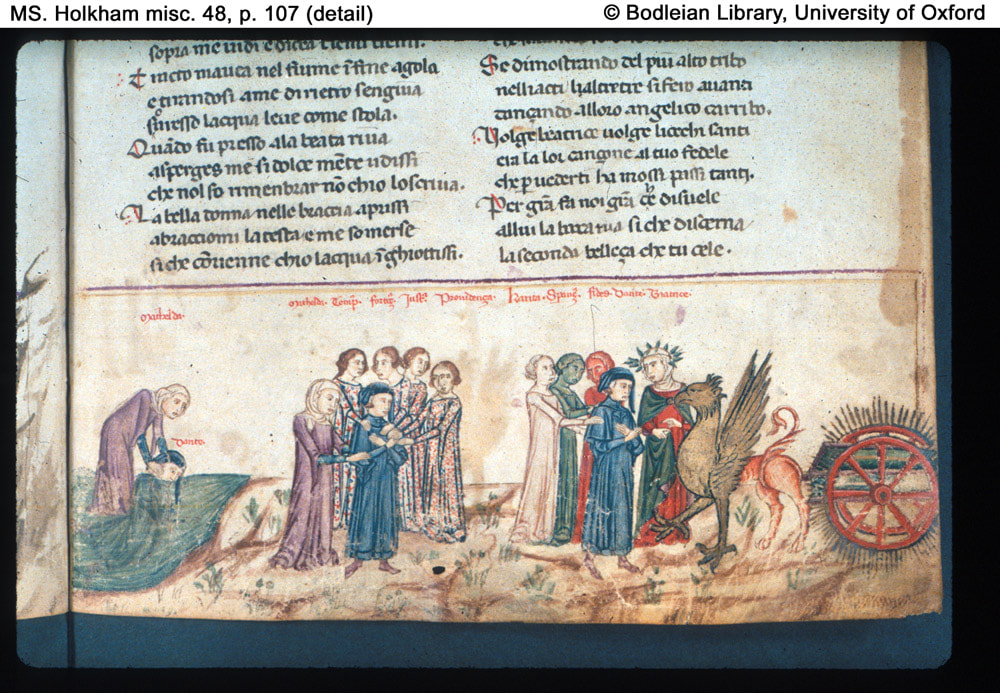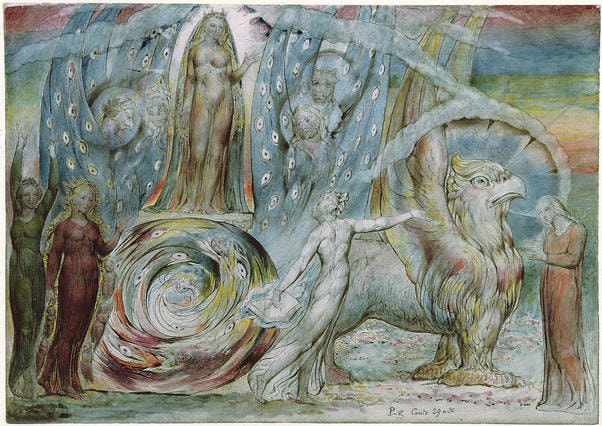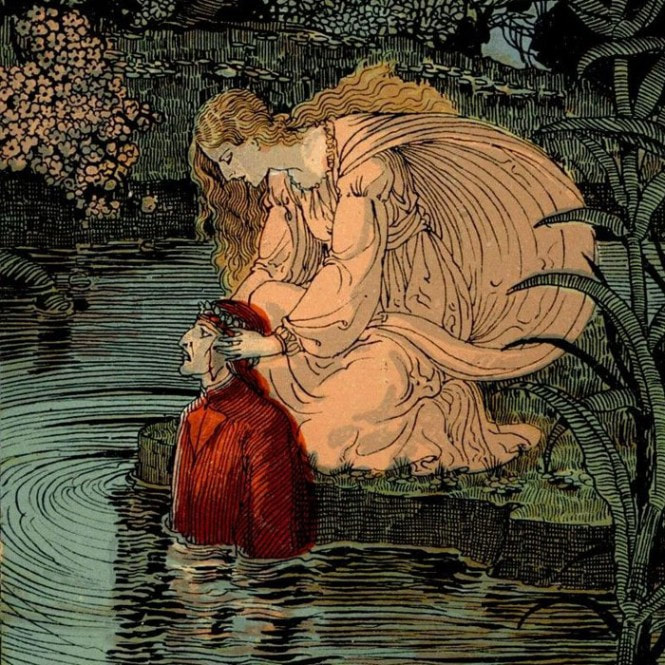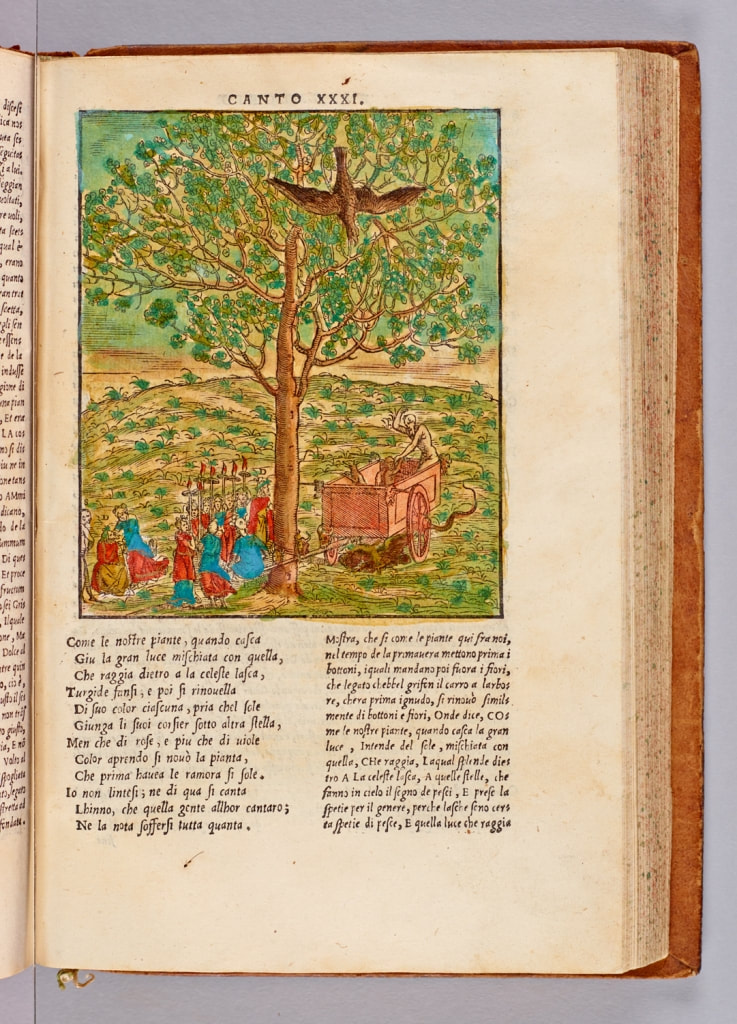Make no mistake, there is needed a full confession from this pilgrim and Beatrice is well aware of this. Let us not forget that it was she who saw Dante the Pilgrim lost in the dark wood due to his sins and wrong choices. His life to this point has been self-referent to the nth degree. In political life he excelled to a dangerous point of exile, due to the reality in Florence. In his poetical life he knew he was the best around, creating luscious poetry and competing with other poets in order to write some of the most erotic poetry ever read in Italian. He followed other women, and then in his Vita Nuova he admits that perhaps, he had gone overboard, that perhaps what was needed in his life was balance and less self-reference but more integrity and constancy. Beatrice, as a symbol of the divine, provides what is needed: brutal honesty and she demands from him a verbal confession. Dante the Pilgrim utters at first a strangled “yes” that can barely be heard.
13 Confusion and fear, mixed together,
Confusione e paura insieme miste
14 drove from my mouth a yes--
mi pinsero un tal "sì" fuor de la bocca,
15 but one had need of eyes to hear it.
al quale intender fuor mestier le viste.
She doesn’t let it rest there, but requires an honest look by Dante the Pilgrim, honesty at deep levels. Indeed, she knows we have an unlimited capacity for self-deception. But Dante must no longer pretend that all is well, but rather admit, as in the dark wood, that his sins are preventing him from going further in the spiritual life, just as in the Inferno, Canto I, the three beasts prevented him from directly climbing the mountain immediately. [In fact, he says as much in vs.35 “they turned back my steps.”] Deep cleaning is required for spiritual growth and integrity in our walk of faith; indeed in our very core. So in the lines 34 to 36 he opens up completely. He knows in his heart of hearts that he has chosen the lesser part.
34 In tears, I said: 'Things set in front of me,
Piangendo dissi: "Le presenti cose
35 with their false delights, turned back my steps
col falso lor piacer volser miei passi,
36 the moment that Your countenance was hidden.'
tosto che 'l vostro viso si nascose."
And now, says Beatrice, now that you have not stayed silent or tried to fool me, God and yourself, we can move forward. It has all be dredged up and is out into the light of day, into the light of God.
Within many religious cultures it is not unusual for pilgrims to continue to be guided by past guides and staretzy [personal spiritual guides in the Russian Orthodox tradition] even after their death. St. Seraphim of Sarov informed his disciples to continue to follow him and visit his grave and he would continue to teach them all they needed. In a sense, this is what Beatrice is doing with Dante the Pilgrim. She began her chastisement in the last Canto and continues it in Canto XXXI, stating that he had been in “errore” by following others [Sirens’ call].
43 'Nonetheless, so that you now may bear
Tuttavia, perché mo vergogna porte
44 the shame of your straying and, the next time
del tuo errore, e perché altra volta,
45 that you hear the Sirens' call, be stronger,
udendo le serene, sie più forte,
Do not miss the insight and truth which Beatrice gives Dante the Pilgrim: the danger to choose poorly, to be lured away from God’s beauty and the life of true integrity will always be there. It will happen again and again. Dante the Poet does not believe in a point conversion, but an ongoing journey of discovery and recovery. She tells him his “errore” can easily be repeated and he must ever be mindful that this journey of discovery is not ever finished: “and the NEXT TIME [altra volta] that you hear the Sirens’ call, be stronger…” Dante the Poet is telling us that perfection in Paradiso is not static, but there will be ever more discoveries and growth and challenges for Dante the Pilgrim. She died, but he could have stayed with the true beauty that was hers, a beauty not rooted in physical reality. This is a kind of “Compare and Contrast:” To settle for less love than God offers, even though it still be beauty, is the real tragedy. One sees it clearly as Beatrice tells Dante the Pilgrim that he chose poorly, following the “mortal thing” as opposed to the “highest beauty.”
52 'And if the highest beauty failed you
e se 'l sommo piacer sì ti fallio
53 in my death, what mortal thing
per la mia morte, qual cosa mortale
54 should then have drawn you to desire it?
dovea poi trarre te nel suo disio?
He can now, being fully honest and mature with his failings and false followings, look upon her and, through her, Christ himself and begin to see the powerful reality into which he will be led by Beatrice in the Paradiso. This is the core of Incarnational Love, and Dante the Pilgrim is almost fully prepared to experience the two in one nature of reality, reflected in her eyes as she gazes upon the Griffin / Christ. Dante the Pilgrim is overcome by that loving reality and collapses.
We see clearly here that Matelda has been John the Baptist as well as showing Dante the Pilgrim around the Garden. She paves the way for Beatrice in the same way John paved the way for Jesus. While she represents the ‘active’ life of faith and Beatrice the ‘contemplative’ side of faith, Matelda also takes charge of the cleansing baptism that is now required, since Dante the Pilgrim has confessed fully, repentant and enlightened. Indeed, the depth of his remorse is an existential recognition in the face of the beauty reflected in Beatrice’s eyes, and later, her smile. He is overcome and then finds himself in Matelda’s arms, but now she is drawing him to the river Lethe. She is now not only John the Baptist in baptizing mode, but she acts as Priest as well, absolving him of all sins as the waters are swallowed and he is released from his past.
94 She drew me into the river up to my throat
Tratto m'avea nel fiume infin la gola,
95 and, pulling me along behind her, moved
e tirandosi me dietro sen giva
96 upon the water as lightly as a skiff.
sovresso l'acqua lieve come scola.
97 When I had come close to the blessèd shore
Quando fui presso a la beata riva,
98 I heard 'Asperges me' [Purge me] so sweetly sung
"Asperges me" sì dolcemente udissi,
99 that I cannot recall nor write it down.
che nol so rimembrar, non ch'io lo scriva.
100 The lovely lady spread her arms,
La bella donna ne le braccia aprissi;
101 then clasped my head, and plunged me under,
abbracciommi la testa e mi sommerse
102 where I was forced to swallow water.
ove convenne ch'io l'acqua inghiottissi.
“Asperges me” comes from Psalm 51:7, (Purge me [with hyssop, that I may be purified; wash me, and I shall be whiter than snow]). Matelda is the agent of absolution here, and she willingly moves Dante to the shore on the other side and then recedes into the background, as did John the Baptist when Christ came on the scene. Dante the Pilgrim is passed on to the four ladies who represent the Cardinal Virtues, who then give him to the three theological virtues. There are reasons for this, for the vision he will now receive is a theological one and the philosophical / cardinal virtues will only take you so far. Yet it is also remarkable to find here the willingness to NOT be center stage, but to gladly and humbly move off the center stage and allow others to take the light. [Luke 9:48 Then he said to them, "Whoever welcomes this little child in my name welcomes me; and whoever welcomes me welcomes the one who sent me. For it is the one who is least among you all who is the greatest."]
Dante the Pilgrim now receives two visions of the Incarnational Reality of God, both of them as reflected by and through Beatrice. He is encouraged by the Theological Virtues to look at the emerald eyes of her as she gazes on the Griffin.
118 A thousand desires hotter than any flame
Mille disiri più che fiamma caldi
119 bound my eyes to those shining eyes,
strinsermi li occhi a li occhi rilucenti,
120 which still remained fixed on the griffin.
che pur sopra 'l grifone stavan saldi.
Once again, there is far more in this Canto than I can ever unpack in this blog. I’d encourage you to find other online blogs and commentaries that unpack ALL these insights, of which there are many, such as how the Two-In-One Incarnational Reality can ever only be viewed aslant, through another reality, hence reflected in Beatrice’s eyes and later in her smile. Dante the Poet admits, TWICE, that it is impossible to explain it all completely. At seeing the wonder of Christ / Griffin as Two-in-One he tells us Dante the Pilgrim is overjoyed, yet still stupefied:
127 While my soul, filled with wonder and with joy,
Mentre che piena di stupore e lieta
He tells us that even the greatest of all poets in the past could not begin to describe the power and revelatory reality of the smile of Beatrice as she views the Incarnational Reality of Christ.
142 would not even he appear to have his mind confounded,
che non paresse aver la mente ingombra,
143 attempting to describe you as you looked,
tentando a render te qual tu paresti
Dante the Pilgrim will be enlightened and encouraged to discover more and more as he moves, like the unicorn in C. S. Lewis’ The Last Battle: “I have come home at last! This is my real country! I belong here. This is the land I have been looking for all my life, though I never knew it till now...Come further up, come further in!” I am deeply appreciative that Dante the Poet seems to confirm what I have found in my own journey; that God’s presence and grace can be discovered in many ways, and divine reality shines forth, aslant, reflected, in the most unexpected of places: in Beethoven’s piano sonatas and string quartets, in the photography of Wm. Terry Gipson and the paintings of Rothko, in the poetry of Emily Dickinson and the mind of Einstein, in the Icons of Russian Orthodoxy and the power of the Sistine Chapel, and so much more. Be it intentionally spiritual or not, God has been revealed to me in a myriad of ways. Like Dante the Poet, I am often stupefied and confounded by unexpected revelations.




 RSS Feed
RSS Feed
